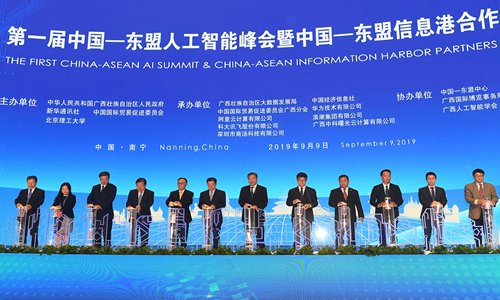HOME >> BUSINESS
ASEAN could overtake EU as China’s largest trading partner under RCEP: analyst
Source:Global Times Published: 2019/9/16 21:43:40

Guests open the first China-ASEAN AI Summit in Nanning, South China's Guangxi Zhuang Autonomous Region on September 9. Photo: VCG
The 10-member Association of Southeast Asian Nations (ASEAN) is likely to become China's largest trading partner surpassing the EU via closer ties under the framework of the Belt and Road Initiative (BRI), experts said on Monday.Zhang Jianping, director of the Research Center for Regional Economic Cooperation of the Institute of International Trade and Economic Cooperation of the Ministry of Commerce, told a forum that ASEAN is likely to become China's largest trading partner via the "diamond decade" vision under the BRI.
The 10-year plan known as the "diamond decade," proposed in 2013, aims to build greater economic cooperation between China and ASEAN members. ASEAN became China's second-largest trading partner in the first half of 2019, overtaking the US for the first time since 1997.
Data from China's customs agency showed that trade with ASEAN increased by 4.2 percent to $291.85 billion in the first half of this year, while China's trade with the US dropped 9 percent to 1.75 trillion yuan ($247.5 billion).
In 2018, China-ASEAN trade reached a record high of $587.87 billion, up 14.1 percent year-on-year. By the end of 2018, China had been ASEAN's largest trading partner for nine consecutive years.
China and the ASEAN countries have a common destiny, responsibility and future in the region to push for the Regional Comprehensive Economic Partnership (RCEP) negotiations to be finalized by the end of this year, said Xu Ningning, executive president of the China-ASEAN Business Council, during the forum.
During the ASEAN Ministerial Meeting held in Bangkok, Thailand earlier this month, commerce and trade ministers from ASEAN's 10 member states and six trade partners - China, Japan, South Korea, Australia, New Zealand and India - affirmed their commitment to finalizing the RCEP by the end of this year.
A deal could be signed as early as next year, said Jurin Laksanawisit, Thailand's deputy prime minister and commerce minister, according to the Xinhua News Agency. "All 16 countries agreed that we should conclude negotiations on technical details of the RCEP in the coming officials' meeting," said Jurin.
"Given the global trade situation and uncertainty, once formed, the RCEP will boost trade and investment and promote sustainable economic development for all 16 countries," he noted.
Xu Liping, director of the Center for Southeast Asian Studies of the Chinese Academy of Social Sciences, told the Global Times on Monday that RCEP is a significant agreement in leading free and convenient trade, to counter the impact on the global economy created by US unilateralism.
However, Xu said that he was only cautiously optimistic about prospects for wrapping up negotiations this year because of India. That country is still a tough issue for the RCEP because it's taking less initiative in promoting the pact compared with other countries.
Launched in 2012, the RCEP will create one of the world's largest trading blocs, accounting for 45 percent of the world population, 40 percent of global trade and around one-third of the world's GDP, media reports said.
Posted in: ECONOMY